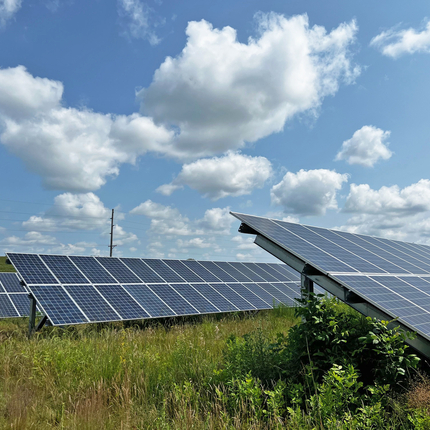Access to renewable energy promotes rural resiliency, enables economic development opportunities, and can lead to lower energy costs. With a recent award funded through the federal Inflation Reduction Act (IRA), the Pine Point Community located on the White Earth Reservation in northern Minnesota can now implement systems to decrease electric utility costs while bolstering the ability of the community to support their own energy needs.
In June, the U.S. Department of Energy’s Office of Electricity selected three communities across the country to receive a total of $3.7 million in project development assistance under the Energy Storage for Social Equity Initiative (ES4SE). The Pine Point Community Microgrid will receive $1.75 million to use energy storage to increase their use of solar power and enable them to manage the community’s energy demand and generation with lower emissions, reduced costs, and more resilience.
The microgrid is located in the Pine Point School District neighborhood, part of the White Earth Reservation and a notably low-income area of the state of Minnesota. Its residents also carry some of the highest energy burdens—the percentage of household income that goes toward utility bills—in the country.
The ES4SE award will provide funding to help the Pine Point Community address its overall energy needs. Launched in December 2021, ES4SE is a multi-phase $9 million effort to help underserved and frontline communities leverage energy storage as a means of increasing resilience and maximizing energy flexibility. The funding promotes an equitable clean energy transition, advances more affordable and reliable electricity, and supports the Biden-Harris Administration’s Justice40 goals.
The all-electric Pine Point School and White Earth Community Center are important community hubs and, as such, carry high energy loads. The new project will expand the capacity of the existing 21 kilowatt ground-mount solar array at the elementary school and community center, including the installation of an energy storage system to help further expand energy capacity. Upon implementation, the added infrastructure will offset 100% of the school’s load, significantly reducing the volume of energy they would otherwise need to purchase, and further expand benefits by providing emergency backup power during climate crises.
Additionally, award funding will be used to provide educational opportunities for students through curriculum integration. The project will install a monitoring interface in the classroom, allowing students to see real-time data from the solar panels at the school. According to Sandra Kwak, founder and CEO of climate justice project developer 10Power, the project incorporates the Ojibwe language.
“Integrating the Ojibwe language into the renewable energy curriculum will further provide pathways for students into the renewable energy industry,” Kwak said.
Workforce development is a critical component of the White Earth project that builds on the direct impact on the school and community center. With a vision to help more Native people enter the renewable energy field, the project will support ongoing operations and maintenance positions.
“Jobs in renewable energy are aligned with our Anishinabee values,” said Winona LaDuke, founder of project partner 8th Fire Akiing Solar. “We have spent so much of our time, energy and limited resources fighting pipelines and fossil fuel projects. It feels good to be building renewable energy projects that create the future that we want.”
The project is a collaboration between the Pine Point School District, the Pine Point Community, 10Power, and 8th Fire Akiing Solar. Climate justice organization 10Power supports Native American Tribal Nations by working to make renewable energy affordable and accessible for tangible improvements in livelihood and prosperity. Located on the White Earth Reservation, 8th Fire Akiing Solar is a Native-run solar thermal organization working to manufacture and install thermal solar systems across the region.
Because of the IRA funding, Pine Point School District and the Pine Point Community will be able to leverage energy storage and solar energy to increase community resiliency and reduce their energy burden. The school and community center will continue to provide resources and support for families with high energy expenses.
Federal funding for energy is crucial for Tribal Nations because it enables them necessary access to resources to develop clean energy projects, improve reliability and affordability within their communities, and advance economic development. The ES4SE award is a major accomplishment for the White Earth Nation.





